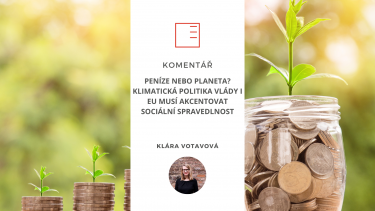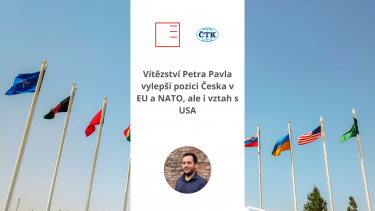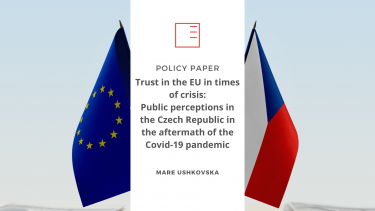ČT24: Disinformation about the ban on cars with internal combustion engines
Our project manager Tatiana Mindeková commented on the growing misinformation about combustion engines and the Green Deal in the CT24 Newsroom.
Show moreWindsor framework and future EU-UK relations: Could personal diplomacy be the driving engine?
The United Kingdom has finally found common ground with the EU regarding the provisions of the Northern Ireland Protocol. The current British prime minister can take credit for what three prime ministers failed to do before. So does Britain's foreign policy stand on a shoulder of one man's personal connections? The question answered our Katřina Horáková in her blog.
Show moreINVITATION | CYBERSEC FORUM/EXPO 2023
CYBERSEC FORUM/EXPO 2023 is a key and unique event on cyber security in Europe. Since 2015, CYBERSEC has provided a space for the exchange of views, discussions and presentations on the biggest challenges facing not only society, but also the virtual world. CYBERSEC is not only a FORUM - it is also one of the largest EXPO spaces, which provides an opportunity to develop business contacts for key entrepreneurs from Poland and around the world, as well as a chance to showcase their innovative products and their services.
Show moreBLOG | Money or planet? Government Climate Policy | EU must emphasise social justice
When the European Parliament finally confirmed the ban on the sale of cars with internal combustion engines in the EU in 2035, it sparked a new round of a well-known debate in the Czech Republic. Is climate and environmental protection worth the threat to prosperity in countries with strong car industries like the Czech Republic? Klára Votavová discussed this topic.
Show moreEU MONITOR | THREE RESPONSES TO DISINFORMATION IN THE EUROPEAN UNION
Disinformation and foreign interference have been concerns in global politics for centuries, but social media algorithms have made the current threat more dire as they amplify content based on human frailties such as our obsession with negativity and outrage. Russian interference in the 2016 US federal election and other elections and referenda in at least twenty countries between November 2016 and April 2019, including the Brexit referendum, the French and German elections, and the Ukrainian power grid cyber-attacks, have highlighted the potential for foreign governments to alter the results of an election or undermine democracies using social media and other means. Writes Jakub Ferenčík in his last EU MONITOR.
Show more PDF
BLOG | European Media Freedom Act on the case of Slovenia: Has Slovenia overtaken the European Commission with its new law?
In September 2022, the European Commission put forward a proposal for a new media regulator - the European Media Freedom Act. Slovenia is one of the most struggling EU countries in terms of media freedom and independence. In the summer of 2020, the Janša government proposed a media-focused law that would increase the state's influence over Slovenia's national press agency and limit its funding of the public broadcaster RTV. Has Slovenia's new law put the European Commission ahead of the game? That is what our intern Klára Landová discusses in her blog.
Show moreSUMMARY OF EXPERIENCES WITH THE INVOLVEMENT OF CSOS IN V4 IN THE DECARBONISATION PROCESS
The project is focused on the examination of the role of non-governmental organizations in the process of decarbonization of coal regions in V4 countries (Czech Republic, Hungary, Poland, Slovakia). The aim of the project is to describe the best and worst practices of the individual processes for Serbia, who awaits the transformation of its energy mix, largely based on coal. The examined V4 countries have had a slightly different share of coal in their energy mix, while the largest one being in Poland and the second largest one in the Czech Republic, followed by Hungary and Slovakia. There are many similarities and differences in their takes on decarbonisation, thus providing different range of experiences.
Show more PDF

ČTK: Petr Pavel's victory will improve the Czech Republic's position in the EU and NATO, but also relationship with the USA
The head of our Brussels office, Žiga Faktor, commented for ČTK on Saturday's victory of Petr Pavel in the presidential elections on the relationship with the EU and NATO. He mentioned that Pavel's accession could bring about a unification of the foreign policy of the government and the Foreign Ministry. He also suggested that the newly elected president would have better relations with the United States
Show more
Policy Paper | Trust in the EU in times of crisis: Public perceptions in the Czech Republic in the aftermath of the Covid-19 pandemic
How has the Covid-19 pandemic affected the Czechs' relationship with the European Union? This topic is addressed in a policy paper by visiting fellow Mare Ushkovska.
Show moreiROZHLAS: Suspension of the Erasmus programme for Hungary? "Punishment and isolation of students."
Hungarian students from 21 universities are at risk of not being able to participate in the Erasmus+ education programme. The European Commission has temporarily cut them off. "The students who stand to lose the most from Erasmus are not the children of upper-middle-class parents, but those from smaller towns and rural areas. They don't have the means to travel abroad," Hungarist Oszkár Roginer, Global EU project manager at the EUROPEUM Institute, criticised the decision to iROZHLAS.cz.
Show more
Staroměstské náměstí 4/1
Prague 1 - Staré Město
110 00
tel.: +420 212 246 552
email: europeum@europeum.org
https://www.europeum.org









